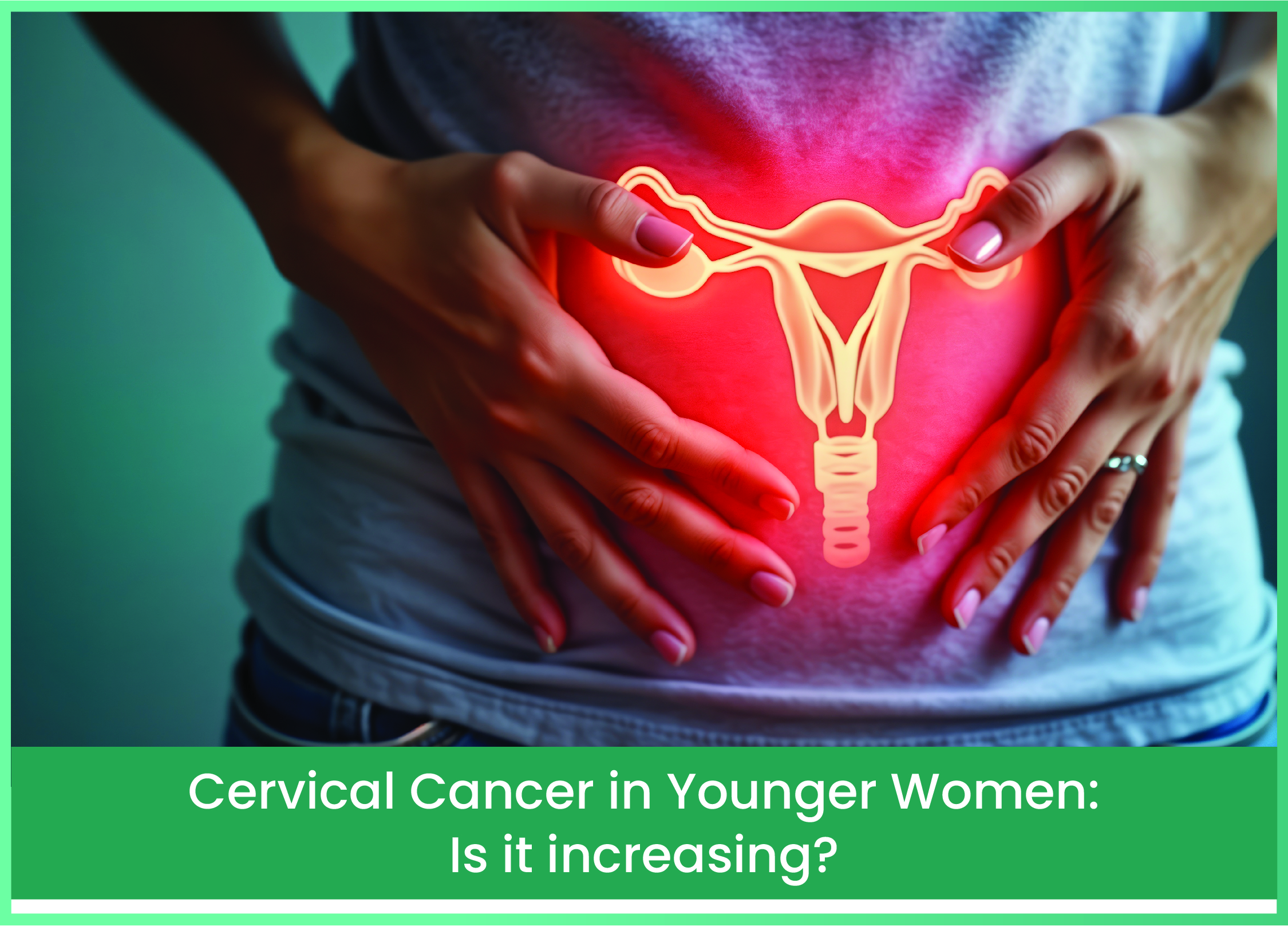Cervical Cancer Risk in Younger Women: Early Detection and Prevention

Cervical cancer is one of the most common cancer affecting women across the world, and it develops in the cervix- the lower part of the uterus that connects to the vagina. For a long time, it was believed to be a disease that affected women in their late 40s or 50s. However, in recent years, doctors and researchers have noticed a worrying trend: cervical cancer is being diagnosed in younger women more often than before. This shift has raised many questions- why it’s happening, what can be done about it, and how can young women protect themselves?
Understanding Cervical Cancer
Cervical cancer develops in the cervix, which is the lower part of the uterus connecting to the vagina. Most cases are caused by a long-term infection with certain types of the human papillomavirus (HPV). While HPV is very common, only some strains cause cancer. The good news is that cervical cancer can be prevented, detected early, and treated successfully — especially if women go for regular screening.
Why Is There Concern About Younger Women?
Traditionally, cervical cancer was more common in women over 40. But in the last decade, cancer registries and hospital data have shown a rise in women in their 20s and 30s being diagnosed. According to specialists like Dr. Reetu Jain, Medical Oncologist in Mumbai, this doesn’t mean that the overall numbers have exploded, but it does mean younger women are no longer out of the danger zone.
Possible Reasons for the Increase in Younger Women:
The exact cause of this shift is still being studied, but several factors could be contributing:
-
Early Exposure to HPV: HPV spreads mainly through sexual contact. With early sexual activity and more partners over a lifetime, the chances of contracting high-risk HPV strains increase.
-
Skipping Regular Screening: Many young women believe cervical cancer is “too far away” to worry about. This leads to skipping Pap smears or HPV tests, which can catch pre-cancer changes before they turn into cancer.
-
Weaker Immunity: A weak immune system due to stress, poor diet, smoking, or certain medical conditions can make it harder for the body to clear HPV naturally.
-
Lifestyle and Health Habits: Smoking, poor diet, obesity, and lack of exercise can all play a role in cancer development.
-
Limited Awareness of HPV Vaccination: While the HPV vaccine can prevent most cervical cancer cases, not all young women in India are aware of it or have access to it.
Signs and Symptoms Young Women Shouldn’t Ignore:
While early cervical cancer often has no symptoms, later stages may present warning signs:
- Bleeding after intercourse
- Bleeding between periods or after menopause
- Unusual vaginal discharge
- Pelvic pain or discomfort during sex
Even if these symptoms are due to something else, getting them checked early can make all the difference.
Importance of Early Detection:
One of the biggest challenges with cervical cancer is that it often shows no symptoms in the early stages. This makes regular screening extremely important. A Pap smear or HPV test can detect abnormal cells before they turn cancerous.
Younger women might think they are “too young” for cancer screening, but this is a dangerous misconception. As Dr. Reetu Jain, the best cervical cancer doctor in Mumbai, explains – cervical cancer can be prevented almost entirely if precancerous changes are found and treated early.
The Role of HPV and Why It Matters:
HPV is the most important risk factor for cervical cancer. It is so common that almost all sexually active men and women will get it at some point in their lives. However, only a few types of HPV are linked to cancer.
The worrying part is that younger women today may have higher exposure to HPV due to changing social patterns. Without regular screening, these infections can go unnoticed until they cause significant problems.
According to Dr. Reetu Jain, Medical Oncologist in Mumbai, educating young women about HPV and promoting vaccination can play a huge role in reversing this trend.
Lifestyle Changes and Prevention:
Preventing cervical cancer is not just about medical tests – lifestyle also plays a huge role. Some preventive measures include:
- Getting the HPV vaccine in adolescence or early adulthood
- Practicing safe sex to reduce HPV exposure
- Avoiding smoking, which increases the risk of cervical cancer
- Eating a balanced diet rich in fruits and vegetables to boost immunity
- Managing stress to keep the immune system strong
The Emotional Impact on Younger Women:
A cancer diagnosis at any age is overwhelming, but for younger women, it comes with additional challenges. Many are in the early stages of their career, planning to start a family, or just beginning adult life. The fear of losing fertility, facing treatment side effects, and the emotional burden can be intense.
Dr. Reetu Jain, the best cancer doctor in South Mumbai, emphasizes that emotional support and counseling are as important as medical treatment. This holistic approach helps patients cope better and recover faster.
Having a knowledgeable and compassionate specialist is crucial for cervical cancer care. Dr. Reetu Jain, Medical Oncologist in Mumbai, brings years of experience in treating women of all ages with cervical cancer. At Jaslok Hospital, she offers advanced treatments, personalized care plans, and clear guidance to her patients.
Her expertise not only lies in treating cancer but also in creating awareness and educating women about prevention. This commitment makes her a trusted name for anyone seeking the best cervical cancer doctor in Mumbai.


